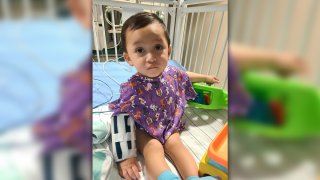
The recent surge in COVID-19 cases among adults has resulted in an increase of an inflammatory syndrome among children, according to a pediatric infectious disease specialist with Rady Children's Hospital.
Since April 2020, Dr. Adriana Tremoulet has seen 44 cases of the rare Multi-System Inflammatory Syndrome in Children (MIS-C) at Rady Children's but the hospital is "really seeing a peak recently with the increased number of COVID-19 cases in adults in our community," she told NBC 7 Monday.
"Gratefully, this inflammatory syndrome is rare in and of itself," Tremoulet added. "There have been children that have, unfortunately, died of this illness but that is uncommon as well."
MIS-C is a syndrome that typically presents itself in children two to six weeks after they have had close exposure to COVID-19, typically through family members who have been infected with the disease.
"There are some children, and we don’t know why yet, that end up developing this inflammatory syndrome a few weeks after the family or someone close by has been infected with COVID," Tremoulet said.
One of those children was 18-month-old Roman Sorcia.
His father, Regulo Sorcia, an essential worker, was the first in his family to get COVID-19. He remembers first feeling ill around Dec. 18. He took a COVID-19 test and isolated until the results came back but it was too late -- his entire family had caught the disease.
Local
It was about four weeks later -- and after the rest of the family had recovered -- that Roman began to show symptoms of illness.
"We thought maybe he was teething," his mother Daniela Maya said. "But then the fever came, and after a few days he also had a runny nose, so we thought maybe it’s the flu or common cold."
Then he stopped eating and drinking fluids.
"He seemed to be in pain, not allowing to touch his belly area, and we saw he was in some pain and that’s when we decided to take him to the doctor," Maya added.
That's when the doctors told Sorcia and Maya that Roman had MIS-C.
"What is that? We'd never heard of that, what is it?” Maya recalled asking the professionals.
MIS-C not an infection, but more a reaction from the child's inflammatory system that can cause fever, rash, red eyes, swelling of hands or feet and severe nausea, vomiting and diarrhea.
For Roman, multiple organs were inflamed so doctors immediately started a treatment to bring the inflammation down. It was working on most organs but it wasn't having the same effect on his heart. That's when the doctors decided to admit Roman to the ICU.
"It’s a roller coaster of emotions especially because they were saying all this was new. OK, so what are we going to do?" Sorcia said. "Thank God that here at Rady Children’s Hospital, they’re working on a plan, and it’s working.”
While the disease is treatable, Tremoulet said it's important that parents know the signs so their children can get the treatment they need in time.
"As parents, we're very good at knowing when our kids are sick and it's really just about knowing that this disease can present two to six weeks later and to bring them to medical care if that’s a concern," she said.
The Centers for Disease Control and Prevention (CDC) said to seek emergency care right away if a child is having trouble breathing, has pain or pressure in their chest, is newly confused, can't stay awake, has severe abdominal pain or has bluish lips or face.
The majority of cases at Rady Children's were among healthy children, Tremoulet said. Doctors have seen cases in children as young as 1 to 2 years old and well into the teenage years. Even some young adults have shown to have MIS-C.
Maya warned that MIS-C is easily confused with other viruses, so watch closely for the symptoms and "if you think something's not normal, even if they tell you it's just a cold, keep asking questions."
"We learned a lot of things about this MIS-C but I think the main thing is just keep protecting yourself, your family, because COVID is real," Sorcia said, admitting that he was one of the disbelievers. "But when you go through the whole process, it changes your mind and it hurts you, even more, when it's happening to your babies, when it's happening to your child."



